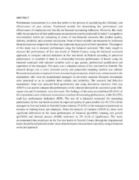A balanced scorecard approach to measuring performance of five star hotels in Nairobi, Kenya.
Abstract
Performance measurement is a term that refers to the process of quantifying the efficiency and effectiveness of past actions. Traditional models for determining the performance and effectiveness of employees rely heavily on financial accounting indicators. However, this study shifts the perspective of how performance measurement can be conducted. In today‟s competitive environments, hotels are competing in terms of non-financial measures like product quality, delivery, reliability and customer satisfaction. None of these variables are measured by traditional financial measures despite the fact that they represent major goals of hotel operations. The purpose of this study was to measure performance using the balanced scorecard. This study sought to measure the performance of five star hotels in Nairobi County using the balanced scorecard approach; to compare selected indicators in five star hotels in Nairobi according to perceived performance; to establish if there is a relationship between performance of hotels using the balanced scorecard with selected variables such as age, gender, professional qualification and experience of the managers. The study was a complete census of five star hotels in Nairobi. The research design was a cross sectional survey and purposeful sampling method was utilised. Research instruments comprised of semi structured questionnaires which were administered to the respondents who were the departmental managers in the hotels sampled. Research instruments were pretested so as to establish their validity and reliability. The research had fifty-five respondents. Data was analysed both qualitatively and using descriptive statistics. One way ANOVA was used to compare the performance of the selected indicators in successive years. Chi-square test and Correlations were also used. The findings of the study revealed that 20 (36%) of the respondents used a balanced scorecard as a method of measuring performance, while 16 (29%) used key performance indicators (KPI). The use of a balanced scorecard for measuring performance in five star hotels resulted in improved quality of guest profiles for 40 (73%) of the managers in five star hotels in Nairobi County whereas 37 (67%) of the managers experienced an increase in training hours per employee. From the analysis of variance (ANOVA), there were significant differences in the mean performance of financial (p=0.000), learning and growth (p=0.014) and internal process (0.000) indicators at 5% level of significance. The study recommended that employees in the five star hotels in Nairobi County through the departmental heads should be enlightened on the value of performance measurement especially using a balanced scorecard approach.
